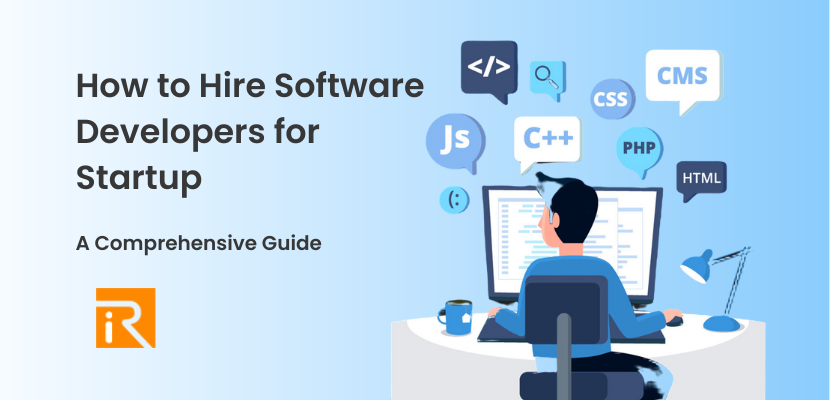Starting a tech startup can be an exciting and challenging endeavor. One of the most crucial steps in building a successful startup is hiring talented software developers who can bring your ideas to life. However, finding and hiring the right software developers for your startup can be a daunting task. Therefore, in this guide, we will provide you with actionable tips and strategies to help you hire top-notch software developers for your startup.
Understanding Your Hiring Needs
Before you begin the hiring process, it’s crucial to have a clear understanding of your startup’s specific software development needs. Ask yourself the following questions:
- What are the key skills and expertise required for the software development role?
- What programming languages and frameworks will the developer need to be proficient in?
- Will the developer be working on the front-end, back-end, or both?
- Are there any specific industry or domain knowledge requirements?
- What is the expected level of experience for the role?
Having a clear understanding of your hiring needs will help you create a targeted job description and attract candidates who are the best fit for your startup.
Crafting an Attractive Job Description
The job description is your opportunity to make a strong first impression on potential candidates. So, to attract top software developers, consider the following tips when crafting your job description:
Be Specific
Clearly outline the responsibilities, required skills, and qualifications for the role. Additionally, avoid vague or generic descriptions.
Highlight Your Startup’s Vision
Share your startup’s mission, values, and long-term goals to attract candidates who align with your vision.
Emphasize Learning and Growth Opportunities
Software developers are often motivated by the chance to work on challenging projects and continuously learn and grow.
Include Compensation and Benefits
While it’s not necessary to disclose exact salary figures, providing a salary range and mentioning other benefits can help attract qualified candidates.
Additionally, remember to optimize your job description with relevant keywords, including “How to hire software developers for startup,” to improve its visibility in search engine results.
Sourcing Candidates
Now that you have a compelling job description, it’s time to start sourcing candidates. Therefore, consider using a combination of the following strategies to cast a wide net and attract top talent:
Online Job Boards
Post your job opening on popular job boards such as Indeed, LinkedIn, and Stack Overflow Jobs. Also, these platforms have a vast user base, increasing your chances of finding qualified candidates.
Networking
Leverage your professional network, attend industry events, and engage with online communities to connect with top software developers. Therefore, networking allows you to tap into a pool of experienced professionals and gain referrals.
Social Media
Utilize social media platforms like LinkedIn, Twitter, and Facebook to promote your job opening. Additionally, join relevant groups and communities, and actively engage with potential candidates.
University Career Centers
Reach out to university career centers and collaborate with them to connect with recent graduates and talented students.
Tech Meetups and Hackathons
Attend local tech meetups and hackathons to meet software developers in person. Additionally, build relationships with potential candidates.
Screening Resumes and Portfolios
Once you start receiving resumes and portfolios from interested candidates, it’s time to screen them effectively. Follow these steps to streamline the screening process:
Define Screening Criteria
Create a checklist of essential qualifications and skills required for the role. Use this checklist as a guide to evaluate each candidate’s resume and portfolio.
Review Resumes
Look for relevant experience, education, and skills that align with your startup’s needs. Pay attention to the candidate’s accomplishments and any notable projects they have worked on.
Assess Portfolios
Carefully review the candidate’s portfolio to gauge the quality of their work. Look for projects that demonstrate their technical abilities and problem-solving skills.
Consider Communication Skills
Evaluate the candidate’s written communication skills based on the clarity and organization of their resume and portfolio.
Narrow down your list of candidates based on their qualifications and the strength of their resumes and portfolios.
Conducting Effective Interviews
Interviews play a crucial role in assessing a candidate’s fit for your startup. Follow these tips to conduct effective interviews:
Prepare a Structured Interview Process
Define a set of standard questions and criteria that you will use for each interview. This ensures consistency and allows for easier comparison between candidates.
Ask Behavioral Questions
Behavioral questions are designed to assess a candidate’s past experiences and behaviors, providing insight into how they may handle situations in your startup. For example, you could ask, “Tell me about a challenging project you worked on and how you overcame obstacles?”
Evaluate Problem-Solving Skills
Present candidates with real-life scenarios or coding challenges to assess their problem-solving abilities. This will help you gauge their technical skills and how they approach and solve problems.
Assess Cultural Fit
Evaluate how well the candidate aligns with your startup’s culture and values. Ask questions that reflect your startup’s work environment and values to determine if the candidate will thrive in your organization.
Remember to create a positive and engaging interview experience to leave a lasting impression on candidates.
Assessing Technical Skills
Assessing the technical skills of software developers is a crucial step in the hiring process. Consider the following methods to evaluate candidates’ technical abilities:
Technical Assessments
Design coding assessments or technical challenges to evaluate the candidate’s programming skills. These assessments can be conducted online or during an in-person interview.
Pair Programming
Pair the candidate with one of your existing developers for a coding session. This will allow you to observe the candidate’s problem-solving approach, collaboration skills, and ability to work in a team.
Code Reviews
Request code samples or open-source contributions from candidates. Reviewing their code will give you insights into their coding style, best practices, and attention to detail.
Be sure to tailor the technical evaluation process to the specific requirements of your startup and the role you are hiring for.
Evaluating Cultural Fit
Cultural fit is as important as technical skills when building a successful team. Assessing cultural fit helps ensure that the candidate will thrive in your startup’s work environment. Consider the following strategies:
Define Your Startup’s Culture
Clearly define your startup’s culture and values. Identify the key attributes and behaviors that align with your startup’s vision and mission.
Behavioral Interviews
Ask candidates behavioral questions that assess their compatibility with your startup’s culture. For example, you could ask, “Describe a situation where you had to collaborate with a diverse team. How did you contribute to a positive team dynamic?”
Team Interviews
Involve multiple team members in the interview process. This allows different perspectives and helps gauge how well the candidate will fit within the existing team dynamics.
Company Values Alignment
Discuss your startup’s core values during the interview and ask candidates how they align with those values. Look for candidates who share similar values and demonstrate a passion for your startup’s mission.
Remember, cultural fit is not about finding candidates who are exactly like the existing team members, but rather about finding individuals who will thrive in your startup’s unique environment.
Checking References
Before making a final decision, it’s essential to check the references provided by the candidates. Follow these steps when conducting reference checks:
Contact Provided References
Reach out to the references provided by the candidate, such as former supervisors or colleagues. Prepare a list of questions to ask about the candidate’s performance, work ethic, and interpersonal skills.
Ask Specific Questions
Instead of asking generic questions, inquire about specific examples of the candidate’s accomplishments and challenges they faced in their previous roles. This will help you gain deeper insights into their abilities and character.
Verify Skills and Experience
Validate the skills and experience claimed by the candidate during the reference check. Confirm their past responsibilities and achievements.
Reference checks provide valuable third-party perspectives on the candidate’s abilities and character, helping you make an informed hiring decision.
Negotiating Job Offers
When you have identified the ideal candidate, it’s time to extend a job offer. Follow these best practices when negotiating job offers:
Competitive Compensation
Research market rates and ensure your offer is competitive. Consider factors such as the candidate’s experience, skills, and the local job market.
Discuss Benefits and Perks
Highlight the benefits and perks your startup offers, such as flexible working hours, professional development opportunities, or equity options.
Consider Future Growth
Emphasize potential growth opportunities within your startup, such as the chance to lead projects or take on more responsibilities in the future.
Be Open to Negotiation
Allow room for negotiation and be willing to address the candidate’s concerns or counteroffers.
Negotiating job offers is a collaborative process that aims to find a mutually beneficial arrangement for both your startup and the candidate.
Onboarding and Retaining Software Developers
Once you have successfully hired software developers for your startup, it’s crucial to focus on their onboarding and retention. Here are some strategies to consider:
Structured Onboarding Program
Develop a comprehensive onboarding program that familiarizes new hires with your startup’s culture, processes, and tools. Assign mentors or buddies to help them navigate their new roles.
Clear Goals and Expectations
Set clear goals and expectations for each software developer. Provide regular feedback and support their professional development.
Create a Positive Work Environment
Foster a positive work environment that encourages collaboration, creativity, and open communication. Recognize and reward achievements to motivate and retain your developers.
Offer Growth Opportunities
Provide opportunities for professional growth and learning, such as attending conferences, training programs, or supporting side projects.
Promote Work-Life Balance
Encourage a healthy work-life balance by offering flexible work arrangements and promoting employee well-being.
Investing in the onboarding and retention of your software developers is crucial for building a strong and successful development team.
Recruitment Challenges (and Solutions) in Hiring Software Developers
Limited Brand Recognition
Startups often struggle with limited brand recognition, making it challenging to attract top software developers who are drawn to established companies with strong reputations.
Solution: Building an Appealing Employer Brand
To overcome this challenge, startups must focus on building an appealing employer brand. This involves showcasing the company’s vision, mission, and culture through various channels such as a career page, social media presence, and participation in tech events. Additionally, highlighting unique perks, flexible work arrangements, and career growth opportunities can make the startup more attractive to potential candidates.
High Competition for Top Talent
The demand for skilled software developers far outweighs the available supply, leading to intense competition among startups and established companies to secure top talent.
Solution: Targeted Talent Sourcing and Networking
To overcome this challenge, startups should adopt a proactive approach to talent sourcing. This involves leveraging platforms like LinkedIn, GitHub, and coding communities to identify and engage with potential candidates. Additionally, attending tech conferences and networking events can provide valuable opportunities to connect with talented developers. By actively seeking out potential hires and building relationships, startups can increase their chances of attracting top talent.
Technical Skill Assessment
Assessing the technical skills of software developers can be a significant challenge for startups, especially when hiring non-technical founders or HR personnel who may not have the expertise to evaluate candidates accurately.
Solution: Involving Technical Experts in the Hiring Process
To address this challenge, startups should involve technical experts in the recruitment process. Collaborating with experienced software developers or hiring consultants with technical backgrounds can ensure a more comprehensive evaluation of candidates’ technical skills. Conducting coding tests, technical interviews, and practical assignments can help assess candidates’ abilities accurately and identify the best fit for the startup’s requirements.
Limited Resources for Compensation Packages
Startups often face budget constraints when it comes to offering competitive compensation packages, making it difficult to attract and retain top software developers who may receive more lucrative offers from established companies.
Solution: Creative Compensation and Benefits Packages
While startups may not be able to match the financial offerings of larger companies, they can still create appealing compensation and benefits packages. This can include equity options, profit-sharing programs, flexible work schedules, professional development opportunities, and a stimulating work environment. By emphasizing the unique opportunities and potential for growth that startups provide, they can attract developers who are motivated by more than just financial rewards.
Lengthy and Inefficient Hiring Process
Startups often struggle with lengthy and inefficient hiring processes, leading to delayed hiring decisions and potential loss of top candidates to competitors.
Solution: Streamlining the Hiring Process
To address this challenge, startups should streamline their hiring process to ensure efficiency and prompt decision-making. This can involve clearly defining job requirements, optimizing job postings, leveraging applicant tracking systems (ATS), and implementing structured interview processes. By reducing unnecessary steps and minimizing the time between interviews and job offers, startups can expedite the hiring process and secure top talent before they are snatched up by competitors.
Cultural Fit and Team Dynamics
Maintaining a cohesive and productive team is essential for startups, and finding software developers who align with the company’s culture and fit well within the existing team can be a challenge.
Solution: Prioritizing Cultural Fit in Hiring
To address this challenge, startups should prioritize cultural fit during the hiring process. This involves assessing candidates’ values, communication styles, and collaboration abilities to ensure alignment with the startup’s culture and team dynamics. Conducting team-based interviews, organizing informal meet-ups, or assigning trial projects can help evaluate how well candidates integrate into the existing team.
Key Motivation Drivers for Startups When Looking to Hire Developers
Startups face unique challenges when it comes to hiring developers. Limited resources, uncertain futures, and the need for rapid growth can make it difficult to attract top talent. However, by focusing on the following key motivation drivers, startups can position themselves as attractive employers and entice developers to join their teams.
Exciting and Innovative Projects
Developers are naturally drawn to projects that excite and challenge them. Additionally, they seek opportunities to work on innovative projects that allow them to push the boundaries of their skills and knowledge. Therefore, startups can leverage this motivation driver by highlighting the exciting and cutting-edge projects they are working on. So, by showcasing your startup’s ambitious goals and commitment to innovation, you can attract developers who crave new and stimulating challenges.
Impact and Autonomy
Developers often desire to make a meaningful impact with their work. They seek roles where their contributions matter and can directly influence the success of the product or service being developed. Additionally, startups can offer developers the autonomy to make decisions and take ownership of their work, providing them with a sense of purpose and the ability to shape the future of the company. Therefore, highlighting the opportunity for impact and autonomy can be a powerful motivator for developers considering job opportunities with startups.
Growth and Learning Opportunities
Continuous growth and learning are essential for developers to stay at the forefront of their field. Startups that prioritize professional development and provide learning opportunities can attract developers who are motivated by personal and career growth. Additionally, emphasize the training programs, mentorship opportunities, and exposure to new technologies that your startup offers. Consequently, demonstrating a commitment to fostering the growth of your developers can be a compelling factor in their decision to join your team.
Flexible and Dynamic Work Environment
Startups often offer a flexible and dynamic work environment that appeals to developers. Unlike larger corporations with rigid structures and processes, startups can provide an atmosphere of creativity and agility. Also, developers are drawn to the freedom to experiment, collaborate, and have a direct impact on decision-making. Therefore, highlighting your startup’s flexible work hours, remote work options, and a supportive team culture can be an effective strategy to attract developers seeking a vibrant work environment.
Equity and Rewards
Equity and rewards play a significant role in attracting developers to startups. Many developers are enticed by the potential for financial rewards that come with joining an early-stage startup. Additionally, offering equity options and performance-based bonuses can demonstrate your commitment to rewarding their hard work and aligning their success with the company’s growth. Therefore, highlighting the potential for financial gain can be a strong motivator for developers who are willing to take risks and invest their skills in your startup.
Collaboration and Team Dynamics
Developers thrive in environments where they can collaborate with talented peers and work in cohesive teams. Additionally, startups that foster a culture of collaboration and emphasize the importance of teamwork can attract developers who value these dynamics. Showcase your startup’s commitment to building diverse and inclusive teams, fostering open communication, and creating a supportive work atmosphere. Therefore, emphasizing the opportunity to work alongside like-minded individuals can be a persuasive factor for developers considering job opportunities with startups.
Recognition and Appreciation
Recognition and appreciation for their work are important motivators for developers. Startups that value and acknowledge the contributions of their developers can create a positive and motivating work environment. Additionally, implementing a system for recognizing and rewarding exceptional performance, such as employee of the month programs or public appreciation, can go a long way in attracting and retaining talented developers. Therefore, highlighting your startup’s culture of appreciation and recognition can make developers feel valued and motivated to join your team.
Work-Life Balance
Maintaining a healthy work-life balance is crucial for developers to avoid burnout and sustain long-term productivity. Startups that prioritize work-life balance and offer flexible work arrangements can be highly appealing to developers. In addition, emphasize your startup’s commitment to fostering a healthy work-life balance, such as offering remote work options, flexible hours, and ample vacation time. Therefore, by demonstrating your understanding of the importance of work-life balance, you can attract developers seeking a sustainable and fulfilling career.
Technological Stack and Tools
Developers are often passionate about the technologies they work with. Startups that utilize cutting-edge technologies and provide access to modern tools and frameworks can attract developers who are eager to stay at the forefront of their field. In addition, highlight the technological stack your startup employs and the tools developers will have the opportunity to work with. Therefore, showcasing your commitment to staying technologically relevant can be a strong motivation driver for developers when considering job opportunities.
Transparency and Communication
Transparency and open communication are vital in building trust and fostering a healthy work environment. Startups that prioritize transparent communication can attract developers who value honesty and openness. Additionally, highlight your startup’s commitment to transparent decision-making, regular updates, and open channels of communication. Therefore, demonstrating a culture of transparency can assure developers that their voices will be heard and that they will have the opportunity to contribute to important discussions and decisions.
Startup Culture and Mission
Startups often have a unique culture and a clear mission that resonates with developers. Developers who are passionate about the startup ecosystem and want to be part of something ground-breaking are drawn to startups with a compelling vision and mission. Clearly articulate your startup’s culture, values, and mission statement when recruiting developers. Showcasing your startup as an exciting and purpose-driven organization can attract developers who align with your values and are motivated by the opportunity to make a significant impact.
Competitive Compensation
While developers may be motivated by factors beyond financial compensation, competitive pay is still an important consideration. Startups that offer competitive salaries and benefits can attract top-tier talent. Research industry standards and ensure that your compensation packages are in line with market rates. Additionally, consider offering performance-based bonuses and incentives to further motivate and reward your developers.
Opportunities for Leadership and Growth
Developers who aspire to take on leadership roles and grow within their careers seek opportunities for advancement. Startups that provide clear paths for career progression and offer leadership roles can attract ambitious developers. Showcase the potential for growth within your startup, such as the opportunity to lead teams, take on challenging projects, or assume managerial responsibilities. By offering a clear roadmap for advancement, you can appeal to developers who are driven to take their careers to the next level.
Positive Reputation and Success Stories
Startups that have built a positive reputation within the industry can be highly attractive to developers. Highlight success stories, achievements, and any recognition your startup has received. This can include positive media coverage, industry awards, or notable partnerships. By showcasing your startup’s track record of success and the impact it has made, you can instill confidence in developers and make them eager to be a part of your journey.
Work Environment and Office Culture
The work environment and office culture of a startup play a significant role in attracting developers. Startups that cultivate a positive and engaging work environment can differentiate themselves from larger, more corporate organizations. Highlight the unique aspects of your office culture, such as team-building activities, casual dress code, or a collaborative workspace. Emphasize the fun and inclusive atmosphere that your startup offers, as this can be a strong motivator for developers seeking a dynamic and enjoyable workplace.
Opportunities for Entrepreneurship
Many developers have aspirations of starting their own businesses or becoming entrepreneurs in the future. Startups that provide opportunities for entrepreneurial growth can be highly appealing to these developers. Highlight the potential for involvement in strategic decision-making, exposure to the startup ecosystem, and the chance to learn from experienced entrepreneurs. By positioning your startup as a launchpad for future entrepreneurship, you can attract developers who are eager to learn and gain valuable experience.
Company Stability and Future Prospects
While startups are known for their agility and innovation, some developers may have concerns about the stability and future prospects of a young company. Addressing these concerns head-on and showcasing your startup’s growth potential can alleviate doubts. Highlight any significant funding or investment received, partnerships with established companies, or a solid business plan for sustainable growth. By demonstrating the stability and future prospects of your startup, you can reassure developers and motivate them to join your team.
Employee Benefits and Perks
Beyond competitive compensation, startups can attract developers by offering attractive employee benefits and perks. These can include health insurance, retirement plans, stock options, gym memberships, or flexible vacation policies. Highlight the comprehensive benefits package that your startup provides to demonstrate your commitment to employee well-being and work-life balance. Additionally, consider unique perks such as catered lunches, game rooms, or professional development stipends. These additional benefits can make your startup stand out and motivate developers to choose your organization over others.
Strong Leadership and Mentorship
Effective leadership and mentorship can greatly influence a developer’s decision to join a startup. Highlight the experience and expertise of your startup’s leadership team. Showcase any industry leaders or experts who are part of your organization. Additionally, emphasize the availability of mentorship programs that provide guidance and support to developers in their professional growth. Strong leadership and mentorship opportunities can instill confidence in developers and motivate them to join your startup.
Positive Employee Testimonials and Reviews
Word-of-mouth recommendations and employee testimonials can be powerful motivators for developers considering job opportunities with startups. Encourage current employees to share their positive experiences and testimonials about working at your startup. These can be featured on your website or shared through social media channels. Developers are more likely to be motivated by the experiences of their peers, so leveraging positive employee reviews can significantly impact their decision-making process.
FAQs
Q: How can I attract top software developers for my startup?
A: To attract top software developers, you can follow these strategies:
- Firstly, craft a compelling job description that highlights your startup’s vision, growth opportunities, and unique projects.
- Second, leverage online job boards and professional networks to reach a wider audience.
- Third, attend tech meetups and engage with online communities to build connections.
- Lastly, offer competitive compensation packages and showcase your startup’s culture and values.
Q: What are some key qualities to look for in software developers for a startup?
A: Some key qualities to look for in software developers for a startup include technical expertise, problem-solving skills, adaptability, collaboration abilities, and a growth mindset. Additionally, assess their ability to work in a fast-paced and dynamic environment, as startups often require quick iterations and the ability to handle ambiguity.
Q: Should I prioritize experience or potential when hiring software developers for my startup?
A: It depends on your specific needs and the stage of your startup. While experience brings a level of expertise and proven skills, potential can bring fresh ideas, adaptability, and a willingness to learn. Therefore, it’s often beneficial to strike a balance between experienced developers who can provide stability and mentorship, and promising candidates who can contribute new perspectives and drive innovation.
Q: What role does cultural fit play in hiring software developers for a startup?
A: Cultural fit is crucial in hiring software developers for a startup. It ensures that the candidate aligns with your startup’s values, work environment, and team dynamics. Additionally, a strong cultural fit leads to better collaboration, higher employee satisfaction, and increased retention. Therefore, look for candidates who not only possess the necessary technical skills but also share similar values and can contribute positively to your startup’s culture.
Q: How can I assess a candidate’s technical skills during the hiring process?
A: Assessing technical skills can be done through various methods, such as coding assessments, technical challenges, pair programming sessions, and code reviews. Consequently, these evaluations help gauge a candidate’s proficiency in programming languages, problem-solving abilities, and adherence to best practices. Additionally, consider incorporating real-life scenarios or projects relevant to your startup’s domain to assess the candidate’s practical application of their skills.
Q: Is it better to hire full-time software developers or consider freelancers or contractors for a startup?
A: The decision to hire full-time software developers or utilize freelancers/contractors depends on your startup’s specific needs and resources. Additionally, full-time developers provide stability, continuity, and the opportunity for long-term growth within your startup. Therefore, freelancers or contractors can be beneficial for short-term projects or specialized expertise. For that, first, consider your budget, secondly, project duration, scalability requirements, and lastly, the need for close collaboration when making this decision.
Q: How can I ensure the retention of software developers in my startup?
A: To retain software developers in your startup, create a positive work environment, offer competitive compensation and benefits, provide growth opportunities, recognize and reward achievements, foster open communication, and promote work-life balance. Additionally, regularly solicit feedback, address concerns, and demonstrate a genuine interest in their professional development and well-being. Therefore, building a strong company culture and a sense of belonging can significantly contribute to the retention of your software developers.
Conclusion
Consequently, hiring software developers for your startup is a critical process that requires careful planning and execution. By understanding your hiring needs, crafting attractive job descriptions, sourcing candidates effectively, conducting thorough interviews, and evaluating both technical skills and cultural fit, you can build a strong and talented software development team for your startup’s success. Additionally, remember to prioritize onboarding and retention efforts to nurture your team’s growth and create an environment where software developers can thrive. Therefore, with the right strategies in place, you can attract top software developers who will contribute to the growth and innovation of your startup.

















